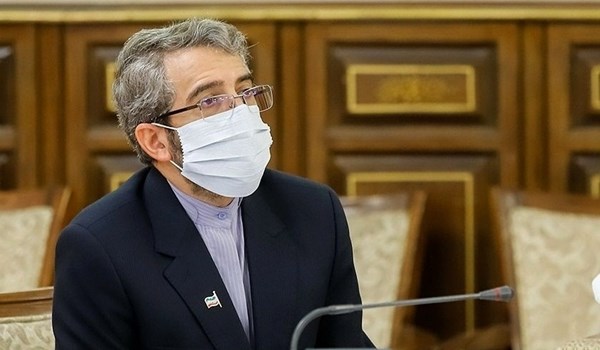Iran’s Deputy Judiciary Chief: Terrorism Major Pillar of US Foreign Policy
Iran's Deputy Judiciary Chief for International and Human Rights Affairs Ali Baqeri blasted the US for violation of human rights in different countries, and said that Washington resorts to terrorist groups to implement its foreign policy.

Baqeri criticized the US violation of human rights in Iraq, Yemen, Palestine and Afghanistan in favor of its own interests, and said terrorism, as a strategic tool, is one of the major pillars of the foreign policy of the US regime.
“In order to reach its illegal goals and interests, the United States uses this strategic tool through harboring terrorist groups and even committing terrorist acts,” he added.
Creating a terrorist group like al-Qaeda, or removing the name of a terrorist group like Mojahedin-e Khalq Organization (MKO, also known as the MEK, PMOI and NCRI) from the list of terrorist groups as well as harboring them and providing them with safety, are different terrorism strategies of the Western countries, Baqeri stressed.
In relevant remarks late last month, Iran’s Judiciary Chief Seyed Ebrahim Rayeesi lashed out at the US and Europe for supporting and hosting members of terrorist groups, including the MKO, who have killed thousands of Iranian people.
“The US has sheltered the murderers of 17,000 Iranian officials and people, while it itself is a terrorist government which has clearly declared that it has assassinated (former) Commander of the Islamic Revolution Guards Corps (IRGC) Quds Force Lieutenant General Qassem Soleimani while he was the official guest of the Iraqi government,” he said.
Rayeesi reiterated the need for a continued legal pursuit into the case of General Soleimani’s assassination by the judiciary and the foreign ministry, saying that his blood will cause expulsion of the US from the region by increasing the regional nations’ awareness.
The MKO is listed as a terrorist organization by much of the international community. Its members fled Iran in 1986 for Iraq, where they received support from then dictator Saddam Hussein.
The notorious outfit has carried out numerous attacks against Iranian civilians and government officials for several decades.
In 2012, the US State Department removed the MKO from its list of designated terrorist organizations under intense lobbying by groups associated to Saudi Arabia and other regimes adversarial to Iran.
A few years ago, MKO members were relocated from their Camp Ashraf in Iraq’s Diyala Province to Camp Hurriyet (Camp Liberty), a former US military base in Baghdad, and were later sent to Albania.
Those members, who have managed to escape, have revealed MKO’s scandalous means of access to money, almost exclusively coming from Saudi Arabia.
The MKO terrorist group specified the targets as martyred Lieutenant General Qassem Soleimani, who commanded the Quds Force of the Islamic Revolution Guards Corps (IRGC), and Iranian Judiciary Chief Seyed Ebrahim Rayeesi.
The terrorist organization said it would “welcome” their assassination, adding that it desired for the ranking officials to “join” Asadollah Lajevardi, Tehran’s former chief prosecutor, and Ali Sayyad-Shirazi, a former commander of the Iranian Army’s Ground Forces during Iraq’s 1980-88 war against Iran.
Earlier in June 2019, a leaked audio of a phone conversation between two members of MKO, revealed Saudi Arabia has colluded with the MKO elements to frame Iran for the recent tanker attacks in the Persian Gulf.
In the audio, Shahram Fakhteh, an official member and the person in charge of MKO’s cyber operations, is heard talking with a US-based MKO sympathizer named Daei-ul-Eslam in Persian, IFP news reported.
In this conversation, the two elements discuss the MKO’s efforts to introduce Iran as the culprit behind the tanker attacks in the Persian Gulf, and how the Saudis contacted them to pursue the issue.
“In the past week we did our best to blame the [Iranian] regime for the (oil tanker) blasts. Saudis have called Sister Maryam (Rajavi)’s office to follow up on the results, [to get] a conclusion of what has been done, and the possible consequences,” Fakhteh is heard saying.
“I guess this can have different consequences. It can send the case to the UN Security Council or even result in military intervention. It can have any consequence,” Daei-ul-Eslam says.
Attacks on two commercial oil tankers in the Gulf of Oman on June 13, and an earlier attack on four oil tankers off the UAE’s Fujairah port on May 12, 2019, have escalated tensions in the Middle East and raised the prospect of a military confrontation between Iran and the United States.
The US, Saudi Arabia, and the UAE have rushed to blame Iran for the incidents, with the US military releasing a grainy video it claimed shows Iranian forces in a patrol boat removing an unexploded mine from the side of a Japanese-owned tanker which caught fire earlier this month.
It later released some images of the purported Iranian operation after the video was seriously challenged by experts and Washington’s own allies.
The MKO which is said to be a cult which turns humans into obedient robots, turned against Iran after the 1979 Revolution and has carried out several terrorist attacks killing senior officials in Iran; yet the West which says cultism is wrong and claims to be against terrorism, supports this terrorist group officially.
After the Islamic Revolution in 1979, the MKO began its enmity against Iran by killings over 17,000 Iranians and terrorist activities. Several members of the terrorist group and its leaders are living in France now, freely conducting activities.
The MKO terrorist group has martyred 17,161 Iranian citizens, including late president Mohammad Ali Rajayee, former prime minister Mohammad Javad Bahonar, late Head of Supreme Judicial Council Ayatollah Mohammad Beheshti, late Deputy Chief of the Iranian Armed Forces General Staff Ali Sayyad Shirazi, and 27 legislators, as well as four nuclear scientists.







